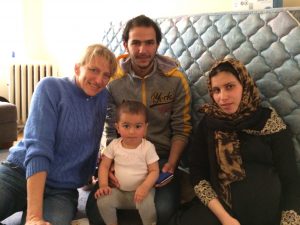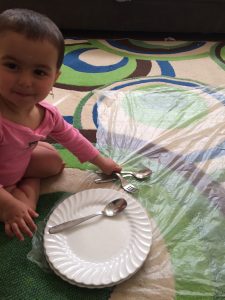#wewelcomerefugees
I’d seen the hashtag. #wewelcomerefugees I knew my friend Jane did some work with refugees. I’d written about them (in books and blog posts and also for Christianity Today), even had a refugee family over for Thanksgiving one year.
But early this year, I felt a tug on my heart’s sleeve, a whisper. Welcome strangers in my name. Especially refugees. Make some space in your life for strangers, and you’ll make some God Space. “Refugees” echoed in my brain and my soul, like a quiet but insistent call.
This was before executive orders codified fear and hatred, but I knew that I had to respond to that tug. I knew, deep in my bones, that loving my neighbor meant exactly what Jesus said it meant—loving the other, the person from another culture. The person so many seemed to fear.
I could (and have) marched with signs, ranted online, called my congressman (his staff might be getting a little tired of my calls). But these things all feel ineffective, in comparison with love. “Go and do likewise” Jesus said after a discussion of neighbors, who they are, and what love looks like. So I’m going, to a little apartment in Chicago, to love my neighbors. And I want to tell you, friend–you could do this too. You could.
I find it curious that Christians are the ones objecting to welcoming strangers, when so much of the Bible tells us to do just that. “Welcome the stranger” and “do not be afraid” are the two most repeated commands in the Bible. And along with the whisper came a memory of a verse written on my heart as a child, “If anyone has material possessions and sees a brother or sister in need but has no pity on them, how can the love of God be in that person? Dear children, let us not love with words or speech but with actions and in truth.” 1 john 3:17-18
Go ahead and object, “We have to be safe!” and I will remind you that Jesus never said anything about safety. He said when we welcome strangers, we are welcoming him. I don’t think he was speaking metaphorically. And also, I’d explain patiently that refugees are already the most stringently vetted immigrants we’ve got—there has NEVER been an act of terror committed by a refugee against Americans. But also, Jesus told us to love our neighbor, and welcome the stranger. What good is it to think you’re “safe” here but lose your soul? (See Matthew 25).
I can argue, write, rant. Or, Jesus smiles at me—you can just love. Give your material possessions, your time, your talents—give them to the least of these.
I went to the city with Jane, with a minivan full of household supplies—dishes, towels, toothbrushes and toothpaste, even, for a family that has arrived, as most refugees do, with little to nothing.
Resettlement agencies rely heavily on volunteers like Jane to provide “Welcome Packs” which is literally everything you would need to set up an apartment (except furnishings).Here’s the list of things we brought that day. Jane’s working with an amazing organization Exodus World Services. They are remaining steadfast in welcoming refugees.

I knew just welcoming this family was not enough. I signed on to be a “New Neighbor” and visit them weekly. I said yes to this opportunity almost reflexively. I have absolutely zero regrets.
For a month now, I’ve gone each Saturday, bringing them various supplies, including a bed with storage drawers (donated by a friend), food, an area rug, and this week, mousetraps. Because mice. Ugh.
This family is becoming dear to me. Their daughter is playful and spunky and adorable. Samiha is shy and kind—last week, they made a meal to share with me. We sat on the floor, as is their custom, and I felt so honored.
Today, a week later, I held their newborn little boy in my arms. Their little girl climbs in my lap when I sit on the floor, pointing to my phone because she wants me to play an Elmo video for her. Her parents watch and smile. These are the Syrian Muslim refugees so many Americans want to vilify and fear. I shake my head. And listen to a little girl’s giggle, watch her hold my phone and dance, snuggle her when she leans up against me.
Abdulrahman and Samiha have become more relaxed around me, and we’ve gotten used to using Google translate to communicate. It’s an odd friendship, growing slowly and even awkwardly, but growing nonetheless.
The drive from my house to theirs takes an hour each way. I’ve almost always got boxes of donated goods loaded in my car. To some, this might seem a burden or inconvenient. But I think of what this young family has been though, and what they’re going through now: living in a tiny one-bedroom walk-up apartment, with a toddler and newborn, in a building with no laundry facilities, and a tiny little mouse problem.
This is not a privilege guilt thing. Because here’s the odd thing about embracing this inconvenience: it feeds my soul. I find my soul stirred and filled each Saturday, when I spend an hour or two with this family. By giving this time, I get more of God. It’s changing my relationship with God, bringing this deeper connection, this sweet, holy, resonance. An inconvenience, embraced, becomes opportunity.
I’ve got a book coming out this fall, called GodSpace: Embracing the Inconvenient Adventure of Intimacy with God. That tiny apartment is quickly becoming a GodSpace.


Keri- I love this journey God has you on. It is inspiring to watch. I cannot wait to read your book. What you are doing is exactly what Jesus would do.
Love God- Love People!
“… I will remind you that Jesus never said anything about safety.”
And I thank you for the reminder, Keri.